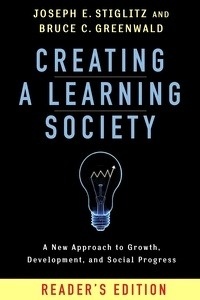Creating a Learning Society
A New Approach to Growth, Development, and Social Progress

Greenwald, Bruce C.
Stiglitz, Joseph E.
Editorial Columbia
Fecha de edición octubre 2015 · Edición nº 1
Idioma inglés
EAN 9780231175494
400 páginas
Libro
encuadernado en tapa blanda
Resumen del libro
Creating a Learning Society explains how the countries of the world went from centuries of stagnation to the enormous increases in standards of living that have marked the last two hundred and fifty years: they have learned how to learn. Yet, as Stiglitz and Greenwald make clear, markets won't succeed on their own in creating the learning society that we need. Achieving this requires good governmental policy in a variety of areas, including trade, industry, and intellectual property. Indeed, the central thesis of this book is that every policy--tax, regulation, and expenditure--affects learning, and that policymakers have been remiss in ignoring this. Some policies, such as the Washington Consensus policies foisted on developing countries by the World Bank and IMF, actually impede learning.
In advanced and developing countries alike, Creating a Learning Society has had a remarkable reception. Governments in Malaysia, Singapore, Turkey, Jordan, and South Africa have signaled strong support for its policies, and a Dutch think tank closely allied with the government released a blueprint for creating a learning economy. This streamlined edition, intended for everyone from scholars to general readers, omits the original book's complicated mathematical equations and, in accessible language, focuses on its central messages and policy prescriptions.
Biografía del autor
Bruce Greenwald es catedrático emérito Robert Heilbrunn de Finanzas y Gestión de Activos en la Columbia Business School y director académico del Heilbrunn Center for Graham x{0026}amp; Dodd Investing. Descrito por The New York Times como un gurú para los gurús de Wall Street , Greenwald es una autoridad en inversión de valor y ha sido premiado en numerosas ocasiones por su extraordinaria capacidad docente. Además, es consultor de mercados de capitales, estrategia empresarial, finanzas corporativas y rendimiento laboral.
Biografía del autor
x{0026}lt;P x{0026}lt;B Joseph E. Stiglitzx{0026}lt;/B , Premio Nobel de Economía en 2001, es actualmente catedrático de economía en la Universidad de Columbia tras una intensa carrera académica en prestigiosas universidades, como Yale, Oxford y Stanford. Además, ha sido asesor económico del gobierno de Bill Clinton y economista jefe y vicepresidente senior del Banco Mundial. Autor del x{0026}lt;I bestsellerx{0026}lt;/I internacional x{0026}lt;I El malestar en la globalizaciónx{0026}lt;/I (Taurus, 2002), también ha publicado x{0026}lt;I Los felices 90x{0026}lt;/I (Taurus, 2003), x{0026}lt;I Cómo hacer que funcione la globalizaciónx{0026}lt;/I (Taurus, 2006), Cx{0026}lt;I omercio justo para todosx{0026}lt;/I (Taurus, 2007), x{0026}lt;I La guerra de los tres billones de dólaresx{0026}lt;/I (Taurus, 2008), x{0026}lt;I Caída librex{0026}lt;/I (Taurus, 2010) y x{0026}lt;I El precio de la desigualdadx{0026}lt;/I (Taurus, 2012).x{0026}lt;/P








